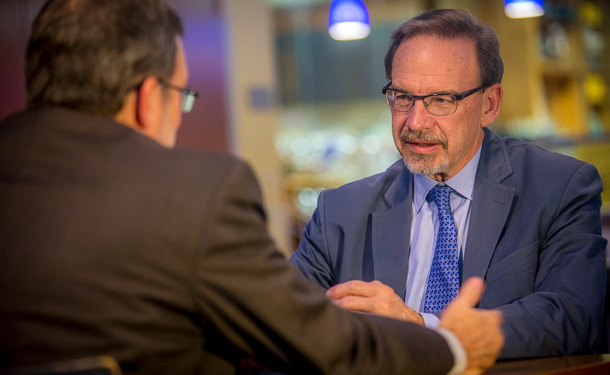David Myers last visited Eastern Mennonite University in 2014 for a one-day visit that included a seminary chapel presentation – “not a sermon,” he said at the time, “but a report of the ongoing conversation inside my head and my heart” – with reflections on his position as director of the Center for Faith-based and Neighborhood Partnerships at the Department of Homeland Security in Washington D.C.
That “conversation inside my head and my heart” continued this fall semester when Myers became EMU’s first practitioner-in-residence for six weeks. He brought good humor, a willingness to subject himself to endless questions and cups of coffee, and a wealth of life experience from which to share.
During days filled with classroom observations, talks and more formal lectures, strategic plannings, and informal interactions with faculty, staff and students, not to mention still keeping in touch with his D.C. staff — Myers was a man on the move.
The result was a kind of Mennonite-inspired Chatauqua — a time both personally restorative and intellectually challenging, “as I’d hoped it would be,” Myers said. “EMU’s academic programs at the Center for the Justice and Peacebuilding, the seminary and the graduate school offered a kind of intersection with my professional life that I thought would be an interesting mix of learning, conversation and feedback … this has really been one of the wonderful experiences of my life.”

Service and leadership
The Practitioner-In-Residence program was developed by the Provost’s Office.
“We want to provide space and time for experienced practitioners and recognized leaders to reflect on their own work and learn new skills by interacting with our own skilled academics and professionals, but we also want our campus community to engage and benefit from the opportunity to learn from a variety of people in diverse settings,” said Provost Fred Kniss.
Myers was a natural selection for the pilot program: his professional life has been spent at the confluence of faith, service and leadership in a variety of positions, including church ministry and nonprofit leadership. He pastored four Mennonite congregations, worked as a conference youth minister, and served two years in Mennonite voluntary service. He also was a founding board member of a state-wide fatherhood initiative, co-founder of an HIV/AIDS social service organization, and director of three homeless organizations.
Appointed by President Barack Obama in 2009, Myers heads one of 13 centers that liaison between the faith-based and neighborhood organizations and their particular “home” agency: other similar centers reside, for example, with the departments of health and human services, education, labor and justice, among others.
Myers says much of his work is with the Federal Emergency Management Agency (FEMA), where he and his staff work to improve partnerships between the Department of Homeland Security and faith-based and voluntary organizations, which are often the “first responders” in emergencies.
In a series of exploratory meetings with programs at EMU, Myers was especially interested in the work of the Center for Justice and Peacebuilding, with a special focus on the Strategies for Trauma Awareness and Resilience (STAR) program.
Because his appointment will end with the conclusion of the Obama Administration, Myers says that some of the ideas he came away with may never come to fruition.
“But I am strongly committed to the idea of trauma-informed congregations,” says this former pastor, “whether that takes the shape of a webinar or a training” created and implemented by his office.
Prompted to reflection and discovery
Myers’ interactions on campus ranged from classroom observation (he particularly enjoyed Professor Ted Grimsrud’s “Biblical Theology of Peace and Justice” class and wanted to stay longer in Professor Catherine Barnes’ course on war-to-peace transitions) to a day-long visit to Eastern Mennonite School.
Opportunities for what he calls “mutual exchange” often nudged him towards personal reflection and insight.
To Professor Jim Leaman’s “Leadership for the Common Good” graduate course, Myers brought moral dilemnas from his own career. With undergraduates in a social work practice, he talked about the role of the executive director and board relations, which turned into a conversation on strategic planning and goal setting.
“People are really curious about the government, so I always try to explain a little bit so that it is not quite so much of a mystery and a little less intimidating,” he told the audience during one of two formal lectures. (The titles of these lectures give a glimpse of his sense of humor and the kind of cultural challenges he has encountered in the past several years: “As Out of Place as a Mennonite (Ordained, No Less) in the U.S. Department of Homeland Security” and “Blowing Down Fences, Making Good Neighbors: Interfaith and Intercultural Collaboration in Disasters.”)
By the end of the six weeks, Myers shared his gratitude for the experience and for the opportunity to share and reflect upon not only his profession, but the Mennonite values that have helped to guide him through the challenges of trying to do good work in a political world. “I’ve learned that I will always have a Mennonite way of being in the world, and I’ll take that assuredly and self-consciously into whatever I do next.”
